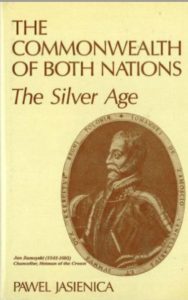 Author Laurence Grimald Gozliski
Author Laurence Grimald Gozliski
Laurence Grimald Gozliski, born in Poland 1530 died 1607, polish nobelman, Bishop of Poznań. The Accomplished Senator book was dedicated to Polish King Zygmunt August. The book proved immensely important in Britain among forces opposed to the Tudor monarchy; it was widely quoted and cited in opposition pamphlets and leaflets during the period leading up to the British Civil Wars of the 1640s.
In this book Goślicki shows the ideal statesman who is well versed in the humanities as well as in economy, politics, and law. He argued that law is above the ruler, who must respect it, and that it is illegitimate to rule over a people against its will. He equated godliness with reason, and reason with law. Many of the book’s ideas comprised the foundations of Polish Nobles’ Democracy (1505–1795) and were based on 14th-century writings by Stanisław of Skarbimierz. The book was not translated into Polish for 400 years.[1]
The book was influential abroad, exporting the ideas of Poland’s Golden Freedom and democratic system. It was a political and social classic, widely read and long popular in England after its 1598 translation; read by Elizabeth I of England, it was also known by Shakespeare, who used his depiction of an incompetent senator as a model for Polonius in Hamlet. Its ideas might be seen in the turmoil that gripped England around the times of Glorious Revolution.Goślicki’s ideas were perhaps suggestive for future national constitutions. Goślicki never wrote that “all men are created equal,” but did say, “Sometimes a people, justly provoked and irritated, by the Tyranny and Usurpations of their Kings, take upon themselves the undoubted Right of vindicating their own liberties.” The book was allegedly read by Robert Bellarmine, Algernon Sydney and Thomas Jefferson (who had it in his library[5]), but there is no evidence of a direct link with Jefferson’s Declaration of Independence.[1]
Goślicki argued that distinguished senators were more useful to a state than the king or the common people:
For the king, being alone, cannot see everything and it often happens that either he yields to desires or his emotions disturb his ability of discretion. Also an ignorant crowd without a thought and head (as a proverb says) cannot by any means possess such prudence, while the senate, composed of men distinguished by virtue, prudence, and glory of accomplished deeds is capable from its middle position, as if from an observation point, of caring for the common weal of the state, perceiving those matters which are beneficial, and freeing it from disturbances, rebellions, and dangers.[2]
He was an influence in the framing the Polish Constitution of 3 May 1791, which historian Norman Davies calls “the first constitution of its kind in Europe”.






